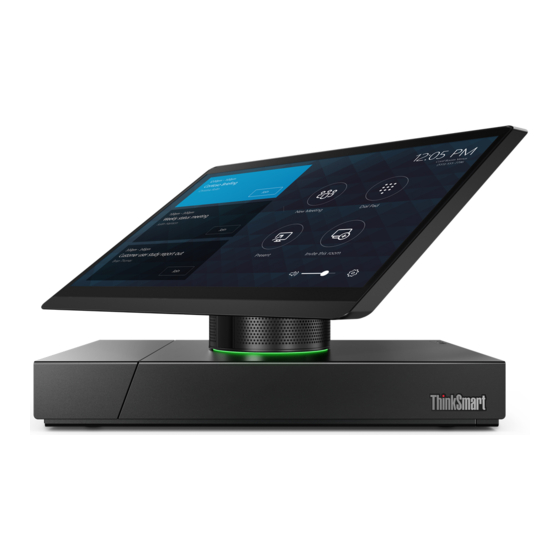- ページ 15
デスクトップ Lenovo ThinkSmart Hub 500のPDF 配備マニュアルをオンラインで閲覧またはダウンロードできます。Lenovo ThinkSmart Hub 500 21 ページ。 Hardware deployment guide for all uc platforms
Lenovo ThinkSmart Hub 500 にも: 安全性、保証、セットアップマニュアル (8 ページ), 配備マニュアル (10 ページ)

Lenovo ThinkSmart Hub 500
Deployment Guide
Power Management
The Hub 500 comes equipped with an IR based human proximity sensor, which detects motion directly
in the line of sight of the sensor and to an extent surrounding areas. The sensor is placed in the middle
of the speaker grill, which is located underneath the integrated display.
The operating range of the sensor is 3 meters minimum and covers +/- 45-degree angle.
When the IR sensor does not detect any motion, the Hub 500 will put the integrated display and any
external display (if connected) into a supported standby mode. When the sensor detects motion, the
Hub will wake up the integrated display and any external displays that are connected to the Hub via
HDMI. Double-tap on the integrated display will also wake up the Hub and external displays if they are in
standby mode.
The SRS app runs 24/7 in the background even if the integrated display is in standby mode.
The Hub 500 does not support HDMI CEC.
Content Sharing
The Hub 500 supports two modes of content sharing, Skype for Business or Lync session based content
share and wired HDMI based content share.
Skype for Business / Lync content sharing
Skype for Business or Lync clients running from client devices such as smartphones, tablets, PCs, etc can
share their content and screen share through the skype or Lync session. When such content is being
shared, the Hub 500 will show the content on the external display that is connected via HDMI to the
Hub.
Note: This shared data is transient and the Hub does not store any user data on a permanent basis.
Wired HDMI content sharing
The HDMI IN port on the back of the Hub 500 provides the HDMI Ingest capability. Connecting an HDMI
cable to the HDMI IN port on the Hub and connecting the other end to the PC or other client device will
instantly show the content of the client device onto the connected external large display. This essentially
is duplicating the screen of the client device onto the large screen.
